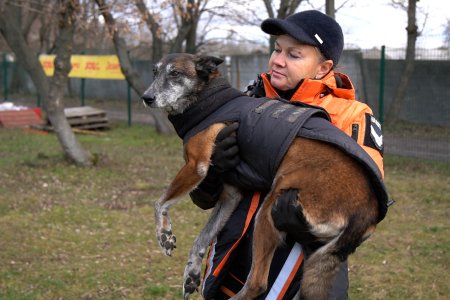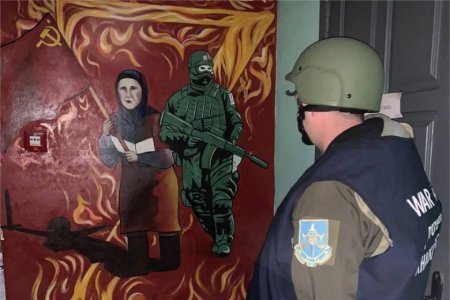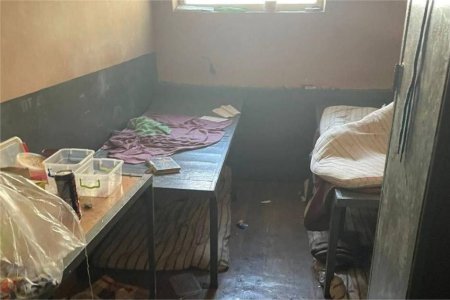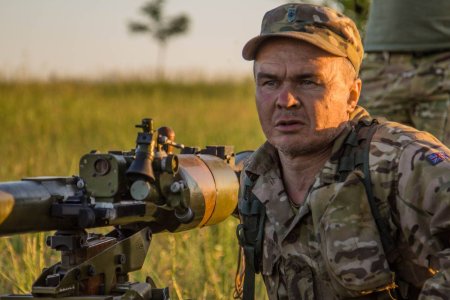— Natalka, you are a journalist, a poetess, a volunteer, the daughter of priest Viktor Marinchak, the pastor of many Kharkiv Euromaidan participants. Describing yourself, in what order would you put these definitions? Who are you, first of all?
— First of all, at some point, I realized that I am a poet. Everything else is a byproduct of this. I am a poet and writer. Later, I became a translator, a cultural manager, and a volunteer. A daughter is a “zero ground”, something that was given from the very beginning, my fate. The realization that I am first and foremost a poet took a very long time to “load”. After all, I graduated from the Faculty of Journalism and worked in the news for a long time. I stopped working there because I realized that the news interfered with my poetic activity.
Then, for about 15 years, I worked in a program focused on the humane treatment of animals. It is an essential part of my life — animals, and how to care for them correctly and ethically. This is because Ukraine is in an awful place in terms of animal treatment culture. And at some point, I realized that poetry would always come first. As soon as I realized this, everything fell into place in the order in which it should have been: books began to be published, and some projects completed as if by themselves. Poetry is what supports me and supports others.
— What keeps you in a front-line city?
— Land. The land of my ancestors keeps me here. Father-priest is keeping me here. Not by force, but still. At the beginning of the full-scale invasion, when the city was empty and only crazy people drove through it, I drove my car, taking my father to work. From the very beginning, we secretly decided as a whole family that we would not go anywhere. I was held by my big dogs, who, unfortunately, left me during the full-scale invasion. What keeps me going is what, in fact, I talk about in my poetry: if we depart from here, then who will keep this city?
— What does the poetess do at war, and what does the war do to the poetess?
— It’s an incomprehensible thing — what a poetess does at war. Well, the poetess is not yet fighting, but she is in the war. I thought for a long time about whether I should join the ranks of the armed forces. And my position is that it would have to be done sooner or later. And I’m ready for it in a sense. The poet must write about the war. Specifically, this poetess writes only about what she experienced and saw with her own eyes. About the previous collection “Vidchaespinne”, many Ukrainian critics said that it was a unique war diary. In some ways, I agree; in others, I don’t, but the dates are essential there. If you look at the historical context that these dates cover, it will become clear what we are actually talking about.

I concluded that poetry is the only art that can respond so quickly, process all events so swiftly, and facilitate, give relief to others in perceiving the chaos, horror, and pain in which we are. What does the war do to the poetess? War takes away loved ones, takes away friends. Takes them to fight. Takes literally, killing them. War limits us in many seemingly insignificant things that we usually do not notice, but which are vital to us. Things that signify our freedom. For example, to go to the nearest McDonald’s at night after writing a text and pretending to be an American is about freedom. And now I can’t afford it.
The war is about changed realities. First, it cuts off all the excesses. Then it reinforced what was left. The war gives us an understanding of how important the very manifestation of life is, how we can live here and now, without delaying anything. But at the same time, it takes away the ability to rejoice: you publish another book, but you don’t rejoice. As a manager, you note: “This task is completed.” You return and take on the next task. Because these tasks are integral to the Ukrainian cultural process, it is now essential for us to publish books. We need to write now. It is necessary to arrive in Germany and present your project. It is vital to talk about that on the international stage. All of it is important because it gives all others an understanding of what is happening to us. Sometimes you can get to them exclusively through poetic texts.
— That is, you disagree with the expression “when the guns speak, the muses are silent”?
— This phrase has always troubled me, because I did not understand: how can poetry — that which supports us in the most challenging moments of our lives, be it unsuccessful love, family problems, significant losses — at the most terrible moment, when war comes, poetry suddenly turn its back on you and leave? No! It has also been proven by many of my friends. Through art, they broadcast this war, process it, they give an opportunity to look at it from a different angle — and this is very important.
It is also a source of information that originates in art and remains within it. Perhaps this will allow the next generation to understand who we were, as it is difficult to even imagine the conditions in which we had to live, while creating a life around ourselves. In general, I believe that Kharkiv residents are a separate anthropological group. Because of the stubbornness with which we continue to do this — to live in the place where the rocket landed yesterday — only very stubborn people can do it.
—Then your work is quite similar to what human rights activists are doing now — they collect the voices of the war, transmit them further, to the whole world, and when it comes to lawyers, to the Ministry of Internal Affairs.
— Someone reports the truth about what is happening, being outside the country, in forced emigration. And this is one voice of war. Someone collects statistical data and evidence of war crimes, then examines all of it. It is the second voice of war. Someone writes poetry about it. Someone is creating a carving about it on a tree. It is a massive team effort. We don’t have a manager.
— Tell us about the project “Trety Deti [Third Generation]”.
— The project “Trety Deti” was presented in Berlin, Cologne, and Kharkiv. This is a large-scale, bilingual project. We did it for two years. In October 2022, we staged a performance together with musician Serhei Davydov. We took the lyrics, his music, and invited Kirill Lukash as a director... And in the Yermylov Center in Kharkiv, when there were only about 300 thousand people in the city at that time, during blackouts, we did a sold-out performance.
"Third generation” is a philosophical concept. It is mentioned in one of the texts: the first group survived the war, gave birth to children, and provided everything to the second group so that they would live well, but still left them the war as a legacy. The second generation did not want war; they wanted to heal their birth trauma, somehow make life more humane. The third generation was born “both under the quiet sky and under the sky which burns and cuts."
“children of war gave birth to children,
so that they would give birth to children of war.
the first children did not want the third generation to see dark dreams,
the first wanted silence.
the second generation never thought of being stronger than concrete,
the second built cities,
lived life,
healed their birth traumas,
so that the third generation would not tremble in their sleep.
the third were born both under the quiet sky and under the sky that burns and cuts...”
The copies are sold in a large box containing a record and a book. The profit from this project will be split 50/50 between the artistic projects and the purchase of what brings death to enemies. A lot of people are involved in the project. Kharkiv Nuremberg House, Svetlana Chistyakova, supported us. To test this project in Germany, we required high-quality translations.
We turned to the now deceased Aleksandra Kovaleva, who did an incredible job with the texts. Konstantin Zorkin created wooden panels: two for the cover and four used in the book. Designer Nadezhda Velichko, who saw and experienced all this. On the record is the voice of Artyom Sukhin, a soldier who recorded poetry while in the trenches defending Kharkiv.
![[Наталка Маринчак — поетка, ведуча радіо “Накипіло”.]](https://khpg.org/files/img/1608823395.jpg)
— How was the project perceived in Germany?
— I understood that sometimes it is necessary to use very primitive, simple language. It was not for nothing that I chose the text with names that are also understandable to foreigners. And they understand that these are our losses, people who are now in danger, people who have lost their homes. These are concrete people.
”... every night I repeat the names,
everyone I know:
protect them, Lord, give them full strength
protect Maksym, Serhei, Andrii, Artem,
Oleh, Serhei, Serhei, Savva,
Oleksandr, Maryan, Anna, Maria,
newborn Dmitry,
sick Elena,
sick Aleksei,
save them all,
everyone, Your hand can reach,
everyone for whom You are the last hope,
and Nadia, who has hopes you also save
save all of them, you hear…”
— You work at the radio “Nakipelo”. Radio itself is now one of the few ways to broadcast to the deoccupied and occupied territories. In some places, there is almost no Internet or communication.
— We remember this all the time. Our broadcast was interrupted a few times. We are now being subjected to a DDoS attack, and our FM is intermittent. This speaks to the importance of what we’re talking about. Everyone on this fantastic team, which Yevgeny Streltsov assembled, is an absolutely incredible people who go on the air, no matter what. Because of the shelling, the electricity was cut off. Still, we finished the broadcasts, because we knew: we were knocked out of FM, but we have a recording, or we will finish everything now on the auxiliary equipment, and then we will put it online for those who have access. We are talking about those who are currently under occupation; we are discussing how children will be connected to educational programs and how to access legal help.
— Why is your program called “Nespeshnye utra [Unhurried mornings]”?
— There is a hidden philosophy in this name; it seems to be about taking your time, but in fact, it is about how to preserve yourself psychologically, mentally, and physically. Not just to reach victory, but to preserve yourself enough to function after it. Because, in my understanding, the most difficult things await us after the victory. Sometimes I talk to artists, and they tell me about their experience of war. This gives radio listeners some understanding that they are not alone in their experience of war.
Sometimes these are very specific things. These are conversations with psychologists, psychotherapists, and psychiatrists. I do not hide the fact that I have been diagnosed with clinical depression. I describe how I experience it, and I discuss the fact that I need the support of doctors. I want to remove the stigma from psychiatrists. Because our society still seems ashamed to turn to them. There are many conversations with various rehabilitation specialists. I talk with civilians, with military men, with people of different professions.
I give these people a voice in their unique, easy-going manner, in order to perhaps calm someone down, give someone hope, provide someone with support under their feet, and explain simple things to someone: how do we breathe under fire? What should we do if we are scared? These seemingly small, insignificant things add up to a magnificent mosaic, from which, perhaps, someone will take something useful. I really hope for this, because all my activities — both as a poetess, as a volunteer, and as a radio host — are aimed at supporting. Because I know how it is when you are not supported. And I know what it’s like when you’re in a depressive pit, and how uncomfortable it is. I don’t want friends, relatives, and even people I don’t know to be there. And if I have a voice and I can allow myself to discuss these topics, then I speak and support as many as I can.




